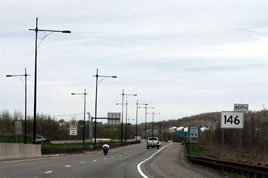Specialty
Air Quality
SECTOR
Transportation
TYPE
Environmental Study
Permitting / Compliance
CLIENTELE
State Government
Federal Government
TIMESPAN
1989 -1994LOCATION
Worcester, MA
Project Number:
284Route 146 Widening & New I-90 Interchange
SERVICE:
Highway Emissions Study and Modeling
DESCRIPTION:
Two significant challenges arose during a project to widen Route 146 and build a new interchange on the Massachusetts Turnpike (I-90), connecting it to the center of the City of Worcester. Federal ozone control regulations required proof that improving traffic operations would simultaneously reduce both volatile organic compounds and roadway nitrogen oxides emissions — a proof that is often difficult to make. In addition, contaminated land in the construction corridor raised community fears about exposure to hazardous air pollutants.
Tech Environmental helped expedite the federal and state approvals for the project by quickly resolving these issues. First, the mesoscale air quality study area was expanded to ensure that the analysis would measure the full regional-trip-reduction benefits of the highway project. TE was thereby able to prove that regional emissions for volatile organic compounds, nitrogen oxides, and carbon monoxide would all decline as a result of the project.
TE then used refined dispersion models to document that the project's construction process would not expose the community to hazards from contaminated soils. The study included a microscale analysis of CO concentrations at 40 roadway intersections for different highway alternatives, and the EPA MOBILE5a, CAL3QHC, and ISCST2 models were employed. Tech Environmental provided expert testimony at public hearings in support of the project.

